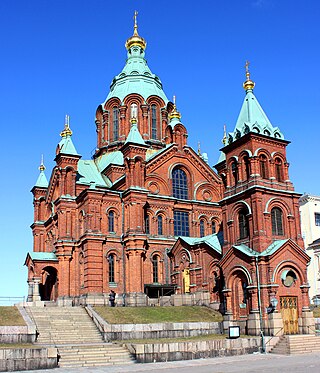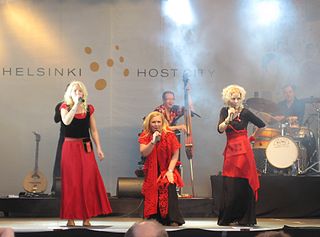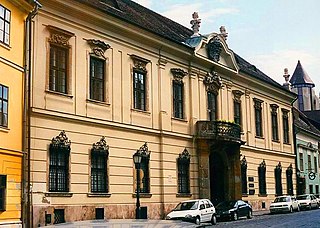The music of Finland can be roughly divided into folk music, classical and contemporary art music, and contemporary popular music.

Music of Russia denotes music produced from Russia and/or by Russians. Russia is a large and culturally diverse country, with many ethnic groups, each with their own locally developed music. Russian music also includes significant contributions from ethnic minorities, who populated the Russian Empire, the Soviet Union and modern-day Russia. Russian music went through a long history, beginning with ritual folk songs and the sacred music of the Russian Orthodox Church. The 19th century saw the rise of highly acclaimed Russian classical music, and in the 20th century major contributions by various composers such as Igor Stravinsky as well as Soviet composers, while the modern styles of Russian popular music developed, including Russian rock, Russian hip hop and Russian pop.

Joensuu is a city and municipality in North Karelia, Finland, located on the northern shore of Lake Pyhäselkä at the mouth of the Pielinen River (Pielisjoki). It was founded in 1848 by Russian Emperor Nicholas I. The population of Joensuu is 78,060, and the economic region of Joensuu has a population of 115,000. It is the 12th largest city in Finland. The nearest major city, Kuopio in North Savonia, is located 136 kilometres (85 mi) to the west. From Joensuu, the distance to Lappeenranta, the capital of South Karelia, is 233 kilometres (145 mi) along Highway 6.

Karelia is a historical province of Finland, consisting of the modern-day regions of South Karelia and North Karelia. Historical Karelia also extends to the regions of Kymenlaakso, Northern Savonia and Southern Savonia (Mäntyharju).

Karelia is an area in Northern Europe of historical significance for Russia, Finland, and Sweden. It is currently divided between northwestern Russia and Finland.

The culture of Finland combines indigenous heritage, as represented for example by the country's national languages Finnish and Swedish, and the sauna, with common Nordic and European cultural aspects. Because of its history and geographic location, Finland has been influenced by the adjacent areas, various Finnic and Baltic peoples as well as the former dominant powers of Sweden and Russia. Finnish culture is built upon the relatively ascetic environmental realities, traditional livelihoods, and heritage of egalitarianism and the traditionally widespread ideal of self-sufficiency.

Värttinä is a Finnish folk music band that started as a project by Sari and Mari Kaasinen in 1983 in the village of Rääkkylä, in Karelia, the southeastern region of Finland. Many transformations have taken place in the band since then. Värttinä shot into fame with the release of their 1991 album Oi Dai. As of 2009, the band consists of three lead female vocalists supported by three acoustic musicians. The vocalists sing in the Karelian dialect of the Finnish language.

Ilomantsi is municipality and a village of Finland. It is located in the North Karelia region. The municipality has a population of 4,406 and covers an area of 3,172.69 square kilometres (1,224.98 sq mi) of which 409.01 km2 (157.92 sq mi) is water. The population density is 1.59 inhabitants per square kilometre (4.1/sq mi). The most eastern point of Finland and of the continental part of the European Union is located in Ilomantsi near the village of Hattuvaara.

Kaustinen is a municipality of Finland. It is part of the Central Ostrobothnia region. The municipality has a population about 4300 and covers an area of 361.12 square kilometres (139.43 sq mi) of which 7.09 km2 (2.74 sq mi) is water. The population density is 11.68 inhabitants per square kilometre (30.3/sq mi).
Hedningarna is a Swedish, and for some years partly Finnish, folk music band that mixes electronics and rock with elements from old Scandinavian folk music. Their music features yoik or juoiggus, a traditional Sami form of song.

J.P.P. is a group of Finnish folk musicians from Kaustinen. The group still uses the Kaustinen traditional settings with fiddles, harmonium and double bass, although their arrangements are more advanced than those of earlier generations of traditional musicians in the area. The group's repertoire consists of traditional tunes, as well as newly-composed music in old-style dance rhythms -- polskas, waltzes, schottisches, etc. -- as well as some Finnish-style tangos, and some jazz and bluegrass influences too.

Traditional music of Karelia is a form of music performed among Karelian people. It has been less influenced by Germanic elements than traditional Finnish music, which is why many Finnish musicians and other creators have used it as source of inspiration. Like other Baltic Finnic people Karelians have performed rune singing. Unlike Finland and like the neighboring Ingrian music of Russia, however, Karelia is also home to musical laments. The kantele is a popular instrument in Karelia as well as throughout Finland.

The Savonian dialects (Finnish: Savolaismurteet) are forms of the Finnish language spoken in Savonia and other parts of Eastern Finland. Finnish dialects are grouped broadly into Eastern and Western varieties; Savonian dialects are of the Eastern variety.

Budapest has long been an important part of the music of Hungary. Its music history has included the composers Franz Liszt, Ernő Dohnányi, Zoltán Kodály and Béla Bartók and the opera composer Ferenc Erkel.
Mauno Järvelä is a Finnish fiddler, violinist and music pedagogue. He is the uncle of Arto Järvelä, and both of them are members in the successful folk music group JPP, whose roots are the pelimanni tradition from Kaustinen. Mauno Järvelä also plays in Timo Alakotilas tango project Unto Tango Orchestra (Tango-orkesteri Unto) together with, among others, Maria Kalaniemi.

Kaustinen Folk Music Festival, celebrated yearly in July in Kaustinen, Finland, is the biggest folk music and dance festival in the Nordic countries. It was first celebrated in 1968. The festival originated in showcasing the famous local fiddle-based music tradition, which has continued uninterrupted 250 or more years, and is still the emotional core of the event. Finland has decided to propose the Kaustinen tradition into Unesco Representative List of Intangible Cultural Heritage spring 2020.

Erik Hokkanen is an American fiddler, guitar player, and composer living in Austin, Texas. Erik is known for performing and composing an array of musical styles, including gypsy music, western swing, surf rock, rock music, rockabilly, bluegrass music, and classical. He moves effortlessly among instruments, often playing violin while an electric guitar hangs down his back. A third generation Finn raised in Florida, Erik has toured extensively throughout Scandinavia, playing major festivals and clubs with top Finnish musicians.

Europeade is the largest festival of European folk culture, held in a different European country each year. The last Europeade was held in Turku, Finland in 2017. The year before that it was held in Namur, Belgium in 2016.

Sheila Surban is a singer and songwriter from the Philippines.
Čičiliusku is a puppet theatre company from the Republic of Karelia in Russia. The company performs in the Karelian language. The company was founded in 2005 at the initiative of Pekka Zaikov, who at the time was the head of the Department of the Karelian and Veps languages. Amongst those who founded the company were teachers, students and alumni of the Faculty of Baltic Finnic languages of the Petrozavodsk State University. The Karelian folk theater was created in order to preserve the Karelian national intangible culture, popularize the Karelian language among children and youth language, introducing the younger generation to ethnocultural activities. A year later the company performed their first play, Kuin hukka vasikalla muamona oli.















